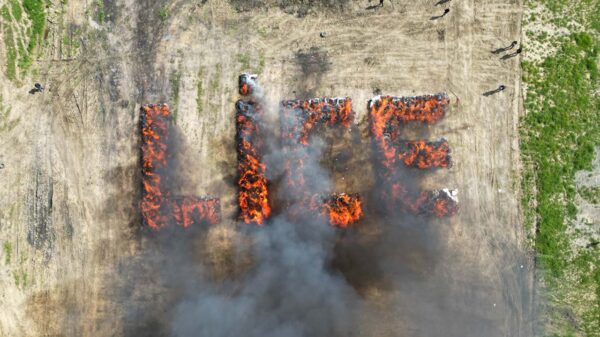Samples of illicit weed seized in Ontario contained potentially harmful pesticides, and THC levels were lower than advertised in some cases, according to police.
In a statement Thursday, Ontario Provincial Police say cannabis was seized from illicit sellers across the province in 2020, and tested by the National Research Council of Canada. In 28 samples of cannabis vapes, researchers found “high levels” of pesticides, and lower THC content than advertised in some cases.
The NRC tested for 96 pesticides laid out in Health Canada’s mandatory testing requirements for regulated cannabis.
Myclobutanil — a fungicide used on crops susceptible to powdery mildew — was the most prominent pesticide found, ranging from 0.3 parts-per-million to over 500 ppm. That’s several thousand times higher than the 0.01 to 0.02 ppm limits for cannabis products set by Health Canada.
“Myclobutanil can generate hydrogen cyanide when heated, a dangerous toxic compound that is linked to various cardiovascular, respiratory and neurological illnesses,” reads the statement.

Police warn ‘high levels of pesticide residue present significant health complications for cannabis consumers’ after 28 vape samples test for pesticides. Chart via the OPP
A pilot test of illicit weed in British Columbia found myclobutanil in 16 out of 18 samples.
Police say several dried flower samples were seized from Ontario sites operating illegally under Canada’s personal production for medical purposes system.
Read more: Testing pilot finds multiple contaminants in illicit BC bud
Read more: Trespass grows threaten wildlife in western US states, study shows
Six sample were tested, and had levels of myclobutanil greater than Health Canada’s limit. Other pesticides were also found in amounts above regulated limits, including metalaxyl, chlorpyrifos and pyrethrins.

Level of pesticides in six samples from illicit dried cannabis. In some cases, pesticides found were 100 times higher than Health Canada’s limit, police say. Graph via OPP
Police say that most of the seized cannabis didn’t advertise THC levels. Of the 28 vape samples, six claimed to have a THC content of more than 90 per cent but actually measured from 45- to 60-per-cent THC.
“By contrast, another study demonstrated that legal cannabis vape liquids from the Ontario Cannabis Store (OCS) can be consistently produced with greater than 80 per cent THC content,” the statement reads.
“In addition to the greater risk of harmful fillers and contaminants with low THC content, this research shows your weed dealer may not be giving you the potency you expect.”

Cannabis vape samples ranged in THC content from less than one per cent to nearly 80 per cent. Chart via OPP
Police warn of the health impacts to cannabis consumers as well as risk to surrounding communities.
The OPP uses an example from a raid in November 2020, when the provincial cannabis enforcement team found large open holding tanks with liquid fertilizer connected to a storm-water pond that flowed into a city drain.
About 75,000 containers of soil were found at the site, and “through a small sample collection, the presence of several hazardous pesticides that require special management were identified.”
“It’s time to know what you’re purchasing and break up with your weed dealer – for your own health and safety,” the statement continues.

Photo via OPP
Follow Kathryn Tindale on Twitter
kathryn@mugglehead.com














